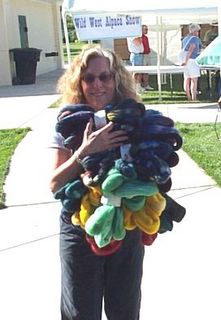I am not a fan of TV. I don't like being marketed to through commercials, and don't like much of the so-called 'popular' shows, especially reality TV shows, which are actually soundbites with the 'real' action taking place when the camera is off.
I just learned the other day that the American Academy of Pediatrics is recommending that children under the age of 2 not be exposed to TV. They say that lots of TV will keep the toddler from proper social-emotional development. The TV is two-dimensional, while what the child at that age really needs is interactive play with real objects, in order to fill in the information blanks in the brain. TV also has a highly addictive quality, as do video games, and to a lesser extent, surfing the Internet. The challenge can be breaking away to deal with your own problems, take care of your own life, rather than stay in a fantasy world where other peoples' lives seem better, more exciting, more fun.
It is true that there are many high-quality television programs out there... personally, I like the travel and nature shows that capture things up close that I will probably never have the opportunity to see myself, such as polar bears who would eat me if I got as close as a telephoto lens can bring them to me. I believe that a parent really needs to watch with their child rather than using TV as a babysitter, and needs to think ahead (or even preview in advance) about how the child at that particular age will view the images and understand what they see. It is much easier to do this with the infant, toddler and preschooler. As the child enters the world of elementary school, the choices widen, though the child may still lack true understanding of the adult content of so-called childrens' movies such as Shrek (many jokes are really only something an adult can understand). Children are beginning to move away from the parent's sphere of influence at this stage, and may spend time at friends' houses where standards are far different about media influences. Parents have to question more and think harder about the limitations they place.
One important way to make sure you know what your child is watching is to have them watch TV or use the Internet in communal rooms, rather than isolated in their own bedrooms. This may seem a nuisance, or turn into a point of contention, but a teen spending long hours locked in their bedroom on the computer is probably not adequately developing social skills needed to move into the adult world. Parents need to exercise scrutiny over music and video games, and articulate to their child why they object to something, such as violence portrayed in video games or sexist or expliotative attitudes in lyrics of songs. Parenting doesn't get easier unless you work hard from the very beginning!
Subscribe to:
Post Comments (Atom)

1 comment:
"Parenting doesn't get easier unless you work hard from the very beginning!" Your closing statement is so powerful. The early years are THE most valuable as they will set the foundation for the life to come.
Post a Comment